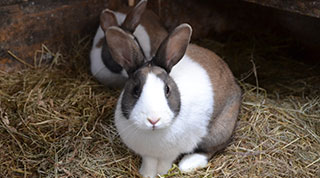Routine Pet Health Care in Northern Ireland
Pet Vaccination Northern Ireland
We firmly believe in the prevention of disease, to help maintain a healthy pet vaccination is highly recommended.
Unvaccinated pets are at higher risk of disease, by choosing to vaccinate your pet against these highly contagious agents it will stimulate their immune system and therefore maximise their protection.
For a routine pet health care check-up and ensure that your pet is fully vaccinated, contact us to arrange an appointment.

Dog Vaccination
- Canine parvovirus
- Canine hepatitis
- Canine distemper
- Leptospirosis
- Parainfluenza virus
- (kennel cough-if required)
- (rabies-if travelling abroad)

Cat Vaccination
- Feline herpes virus
- Calicivirus
- Panleukopenia
- Leukaemia

Rabbit Vaccination
- Myxomatosis
- Haemorrhagic diarrhoea
Microchip
Microchipping is not only a legal requirement but an excellent way of identifying your pet should they become lost.
This is a simple a quick procedure whereby a microchip is inserted under the skin causing no more discomfort than a standard vaccination.
We are happy to offer both standard sized microchips and also mini microchips which are suitable for smaller pets.

Neutering
If you do not intend to breed from your pet there are many health benefits in deciding to have them castrated or spayed.
These are day procedures so your pet can be admitted in the morning and discharged that afternoon/evening.

In Bitches the advantages include:
- Removes the owner stress of dealing with your bitch coming in heat which can last up to 3 wks and occur every 5/6 months
- No unwanted pregnancies, a litter of pups are a large responsibility and finding suitable homes can be difficult.
- No risk of false pregnancies
- No risk of pyometra, this is a potentially life threatening of the uterus
- Significantly reduces the risk of mammary tumours if performed at the right time.
In Dogs the advantages include:
- Can reduce roaming and reduce male dominance behaviours
- Removes the risk of testicular tumors
- Reduce the risk of some prostatic conditions
In Queens the advantages include:
- No unwanted pregnancies, a female cat can have multiple litters in one year!
- Reduce the risk of contracting feline leaukamia virus and FIV through mating behaviours
- No risk of ovarian or uterine disease
In Toms the advantages include:
- Reduced roaming and therefore reduced risk of injury
- Reduced risk of male dominance behaviours and fighting and therefore reduced risk of contracting Felv and FIV
- Less likely to spray
- No risk of testicular tumours
To book you pet in for neutering please contact our clinic
Parasite control
Fleas
Fleas are one of the most common parasites that can infect your pet. ‘Flea dirt’ can sometimes be seen as small specks on your pets hair, they can cause intense scratching and in some cases this can result in considerable levels of discomfort due to secondary skin infections. We can tailor treatment and prevention options to best keep these pesky parasites under control.
Protect your pet against ticks, not only can they cause localised irritation but can also transmit lyme disease a devastating condition caused by the transfer of bacterial infection. Although numbers increase from March to November ticks can be a year round problem and so it is important that we include tick control in our routine preventative measures to optimise pet health


Worms
Intestinal worms are common in our pets and there is a risk of spread to humans. Dogs and cats can be infected by worms at any stage of their life so effective, regular treatment is required. Puppies and kittens should be treated against worms every 2 weeks until 12 weeks old then every month until 6 months old and then every 3 months for the rest of their lives. In some cases worm treatment can be increased to every month.
